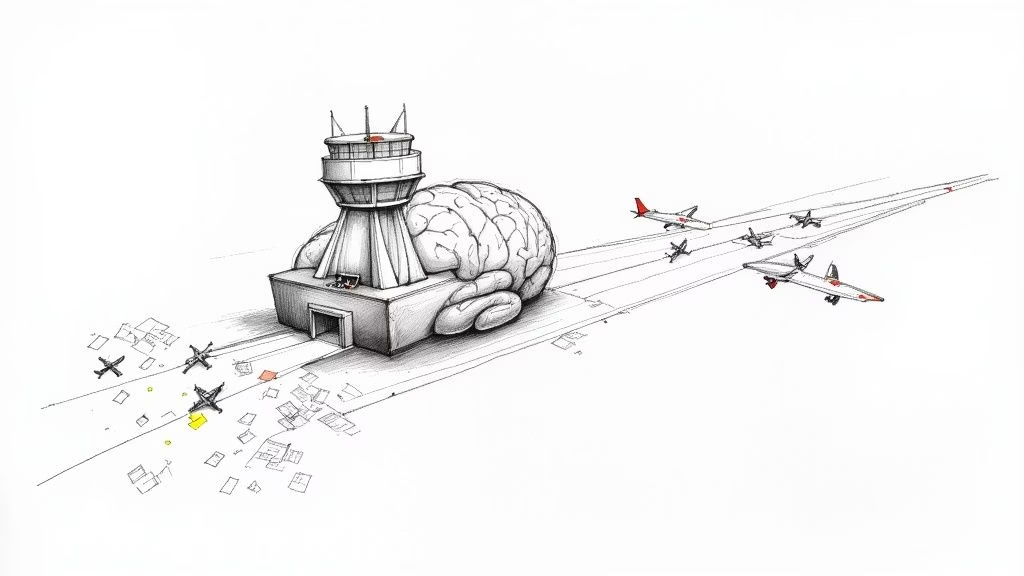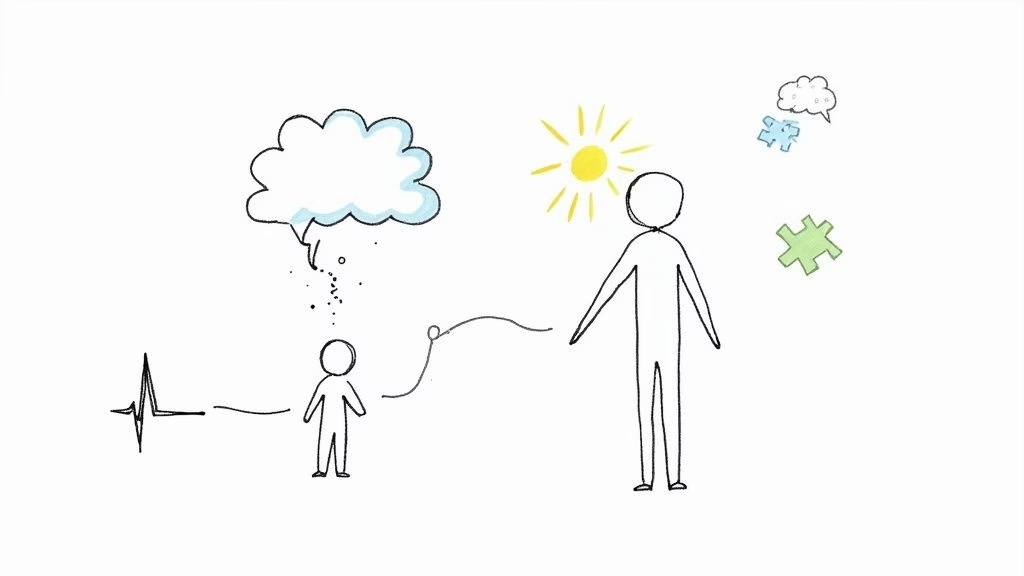If you’re staring at a textbook but your mind is a million miles away, you’re not alone. The ability to lock in and really concentrate isn't just about willpower; it's a skill, and like any skill, it needs the right conditions to flourish. Let's be honest, today's world is practically designed to fracture our attention, from the endless ping of social media notifications to the constant hum of academic pressure.
The game has changed, especially with the rise of online learning. Recent figures show a staggering 200% growth in online learning adoption over the last five years. With 63% of K-12 students now using digital learning tools every single day, the line between your study space and your distraction space has become incredibly blurry. This new reality demands a whole new set of strategies to stay on task. You can get more insights on this massive shift over at DevlinPeck.com.
To really get a grip on focus, we need a plan. I've broken down the approach into four core pillars that address everything from your physical space to your mental game.
Four Pillars of Unbreakable Study Focus
A quick look at the core concepts in this guide that will transform how you study.
| Pillar | What It Covers | Why It's a Game-Changer |
|---|---|---|
| Environment | Designing a physical and digital workspace that eliminates distractions. | Creates a clear signal to your brain that it's time to work, making it easier to get into a state of flow. |
| Mindset | Shifting from a "have to" to a "want to" mentality and overcoming mental blocks. | Turns studying from a chore into a challenge, boosting motivation and reducing procrastination. |
| Techniques | Using proven time-management methods like the Pomodoro Technique. | Structures your study sessions for maximum efficiency and prevents burnout. |
| Well-being | Prioritizing sleep, nutrition, and exercise to fuel your brain. | A healthy body is the foundation for a sharp, focused mind. You can't perform your best when you're running on empty. |
Each of these pillars builds on the others, creating a powerful system for deep, effective learning.
Why You Struggle to Focus While Studying
Ever notice how a lack of focus can feel like a downward spiral? It usually starts with feeling overwhelmed by a big assignment. So, you procrastinate—maybe just a quick scroll through your phone. Before you know it, that procrastination turns into guilt and anxiety, which makes it even harder to find the motivation to start. Sound familiar?
Breaking this cycle is everything. The first step is realizing that procrastination isn't just laziness. It’s often a symptom of something deeper, like a fear of failure, crippling perfectionism, or simply not knowing where to even begin. Real, sustainable motivation isn't some magical feeling you wait for; it's something you build, one small, consistent action at a time. Each tiny win proves to yourself that you can do this.
For parents, understanding this dynamic is the key to offering real support instead of just adding more pressure. It's about coaching, not commanding.
This chart shows just how much of a difference the right strategies can make, dramatically boosting both your focus and how much information you actually retain.
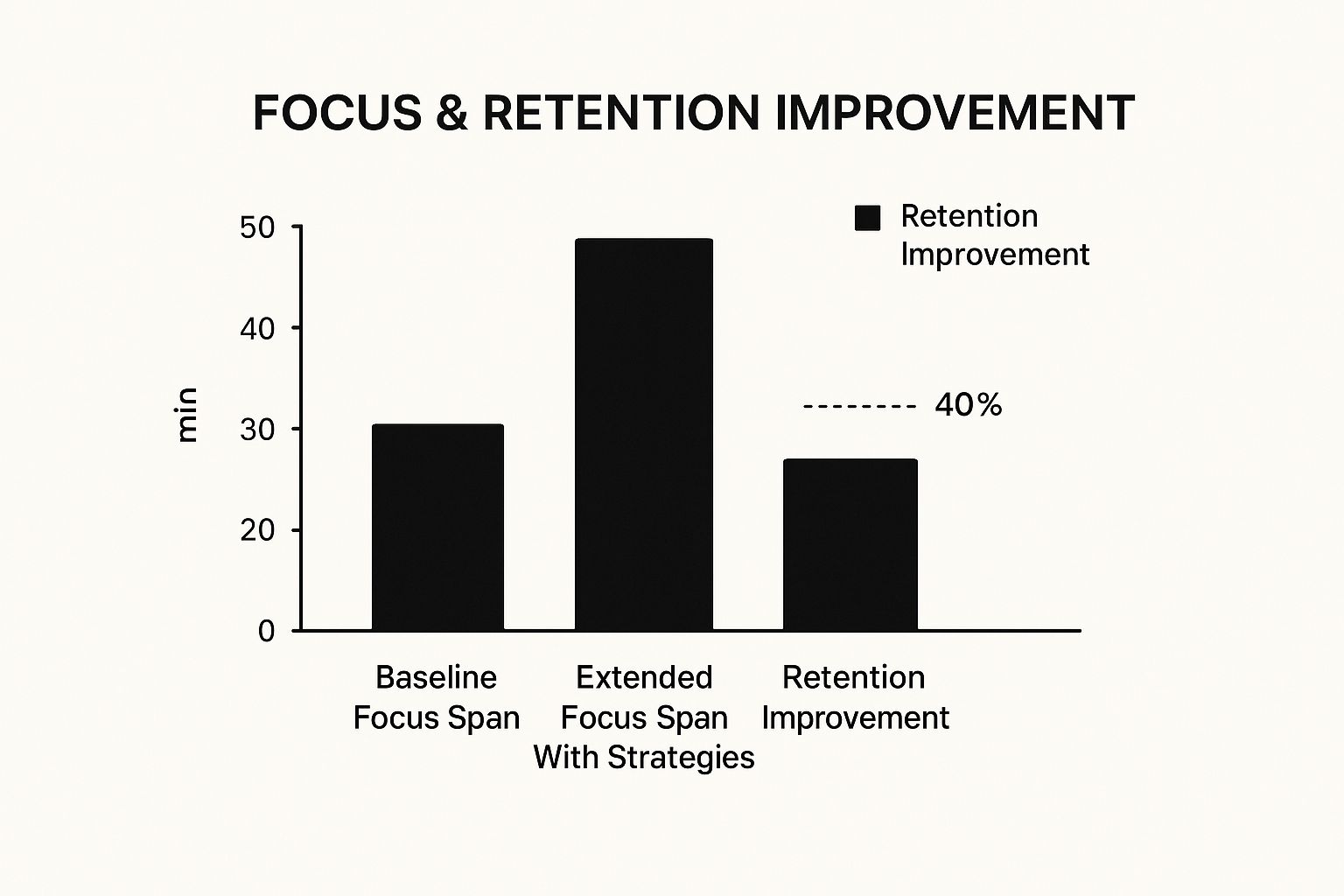
As you can see, implementing a few dedicated techniques can more than double your effective study time and make a huge impact on what you remember long-term.
Building Your Ultimate Distraction-Free Study Zone
Your brain is constantly taking cues from your surroundings. If you try to study in your bed—the place you associate with sleep and relaxation—you’re sending it mixed signals. It’s no wonder focus feels impossible. The real goal isn't just to tidy up; it’s to intentionally design a space, both physical and digital, that tells your brain, "It's time for deep work."
Think of it like creating a command center for learning. This doesn't have to be a whole separate room; a specific corner of your bedroom works just fine. The magic is in consistency. When you only use that space for studying, you forge a powerful mental connection that helps you drop into a state of focus almost instantly.
Crafting Your Physical Space
First things first, let's cut down on the physical distractions. Something as simple as positioning your desk to face a wall instead of a window or a busy hallway can make a huge difference. You're immediately removing a massive source of potential interruptions.
Next up is ergonomics. An aching back or a stiff neck from a bad chair setup is a sneaky but constant distraction. Make sure your chair actually supports your back, your feet can rest flat on the floor, and your monitor is right at eye level. This isn't just about being comfortable; it's about eliminating those little physical annoyances that silently drain your mental energy and break your flow.
Taming Your Digital World
Your digital world is just as important—if not more so. That endless stream of pings, dings, and notifications is one of the single biggest enemies of deep focus. The first easy win is to turn off all non-essential notifications on your phone and computer.
For a more powerful approach, apps like Forest and Freedom are absolute game-changers. They let you temporarily block distracting websites and apps, basically creating a digital sanctuary where you can actually concentrate without the temptation to scroll.
Pro Tip: Don't just block social media. Be ruthless. Block news sites, shopping apps, and anything else that might pull your attention away. The whole point is to create an environment where you can be completely intentional with your focus.
Here’s a quick look at the Forest app. It gamifies the process by letting you grow a virtual tree while you focus.
If you cave and leave the app, your tree withers. It's a simple but surprisingly effective nudge to help you stay on task and build healthier digital habits.
A Guide for Parents Supporting Teen Focus
Parents, you have a massive role to play in helping your teen learn how to concentrate. Your support can be the key to helping them manage school pressures and get past procrastination.
- Establish "No-Interruption" Zones: Work together to create dedicated study times when interruptions are off-limits. This could even become a family-wide "quiet hour" in the evening.
- Respect Their Space: Once you've established a study zone, treat it as sacred. Avoid popping in with "just one quick question," because that's all it takes to shatter their concentration and make it incredibly hard to get back on track.
- Model Healthy Boundaries: Show them what good digital habits look like in action. Put your own phone away during dinner or family conversations. This demonstrates that being present and managing digital noise is a priority for everyone.
When you approach focus as a team, you're not just helping them study for the next exam—you're empowering them to build habits that will stick with them for life.
Master Your Mindset to Beat Procrastination
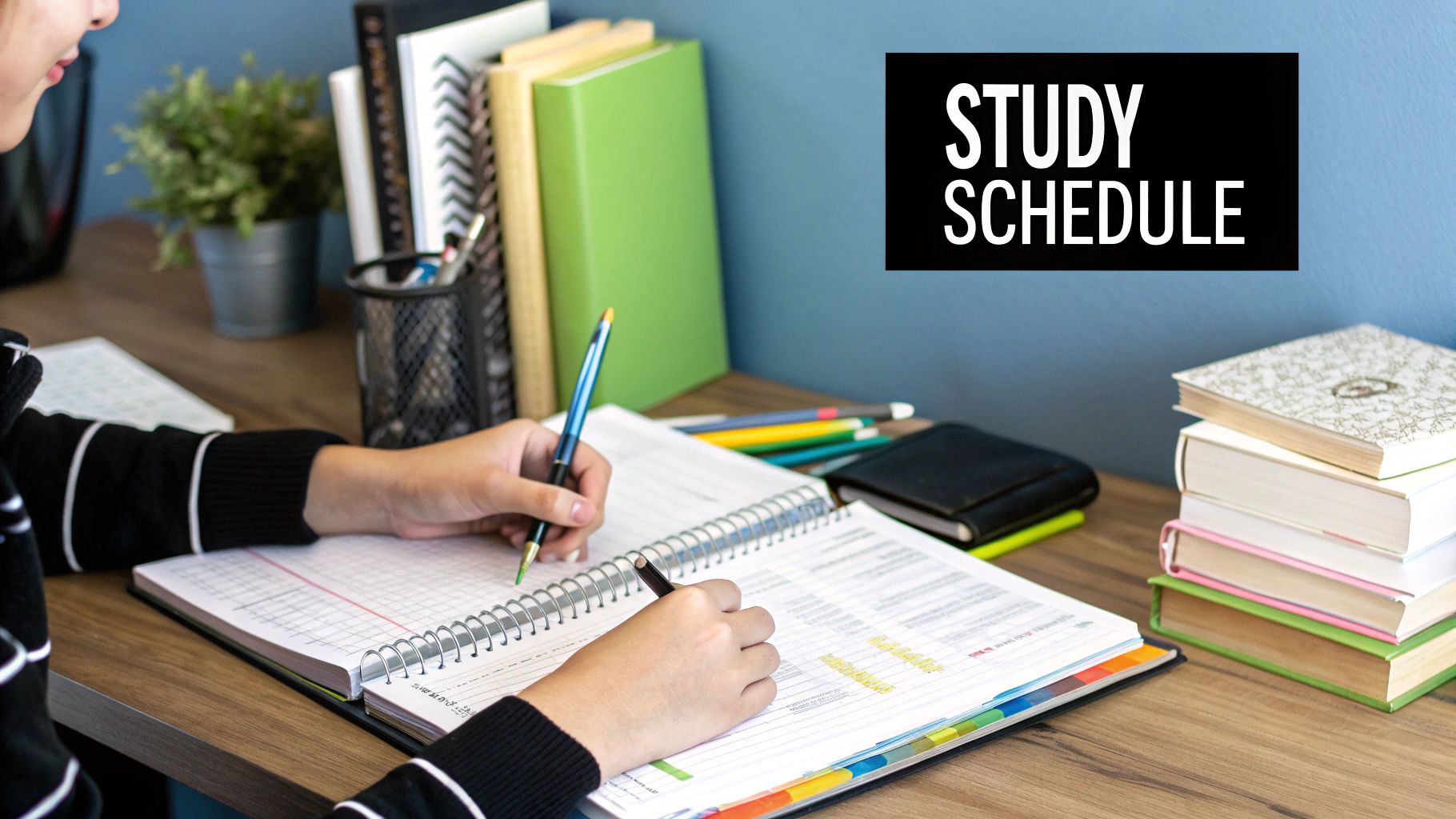
Setting up the perfect study zone is a great first step, but it’s only half the battle. Real, lasting focus is an inside job. If your mindset is working against you, even the quietest room won’t stop your thoughts from drifting. The real secret to learning how to focus while studying is getting a handle on the psychology behind procrastination, motivation, and the anxiety that often comes with school.
Procrastination isn’t some deep character flaw. More often than not, it’s just a reaction to feeling completely overwhelmed or anxious. When an assignment looms large and intimidating, our brains naturally seek the instant relief of a distraction. It's a normal human response, but it traps us in a vicious cycle of stress and avoidance.
Break Down Overwhelm with Micro-Goals
The antidote to feeling overwhelmed is to shrink the task until it’s no longer scary. Stop staring at the mountain of a project—like "write a 10-page history paper"—and break it down into ridiculously small, achievable steps. This simple trick turns a daunting challenge into a simple, satisfying checklist.
Your micro-goal list might look something like this:
- Open a new document and just write the title.
- Find three credible sources for the first section.
- Write only the first paragraph of the introduction.
- Draft a single bullet point for your outline.
Each tiny step feels manageable, which instantly lowers the mental barrier to getting started. A great way to kick this off is the "Two-Minute Rule." Just commit to working on something for two minutes. Seriously, that's it. You’ll often find that overcoming that initial inertia is the hardest part, and you'll keep going long after the two minutes are up.
Cultivate Genuine Motivation and Positive Self-Talk
Motivation isn't some lightning bolt of inspiration that strikes out of nowhere; it’s a muscle you have to build. The best way to strengthen it is by connecting your schoolwork to your real interests and long-term goals. How does nailing this chemistry chapter help you get into that pre-med program you’re dreaming of? How will acing this presentation build the confidence you need for your future career?
This internal drive is way more powerful than external pressures like grades. A huge meta-analysis found a strong link between disciplined study habits and academic success. In fact, one study with 570 college students showed that regular, focused study sessions were significantly tied to better goal attainment and higher grades.
Your inner dialogue literally shapes your reality. Negative self-talk like "I'm so bad at math" or "I'll never finish this" just reinforces a sense of defeat. You have to actively replace those thoughts with positive, action-oriented ones: "I can solve this first problem," or "I will focus for the next 25 minutes." It might feel a little forced at first, but over time, it genuinely rewires how you approach challenges. Our guide on how to find motivation dives deeper into building this crucial skill.
Parenting Tips for Fostering a Growth Mindset
Parents, your role here is pivotal. Your teen is navigating immense pressure, and your support can make all the difference in helping them manage school, motivation, and procrastination without spiraling.
- Focus on Effort, Not Just Grades: Praise their hard work, persistence, and the strategies they use, not just the final letter grade. This teaches them that progress—not perfection—is the real goal.
- Validate Their Feelings: Instead of saying, "Don't be stressed," try something like, "I can see this project is stressing you out. Let's break it down together." This opens the door to productive problem-solving instead of shutting down the conversation.
- Encourage Mental Health Check-ins: Normalize talking about mental well-being. Asking "How are you feeling about school lately?" can reveal the underlying anxiety that's actually fueling their procrastination. For teens who need more support, resources like The Jed Foundation and NAMI offer incredibly valuable guidance and help.
Practical Techniques to Sharpen Your Concentration

Alright, your study space is set and your mindset is dialed in. Now it's time to get into the nuts and bolts of focus. Knowing how to concentrate isn't about brute force; it’s about having the right tools in your toolkit. These methods are designed to help you work with your brain, not against it, so you can learn deeply without burning out.
Most of us fall into the trap of passive learning—endlessly rereading notes or highlighting half a textbook. It feels productive, but the information rarely sticks. The goal is to shift from being a passive observer to an active participant in your own learning. These next techniques will show you how.
The Pomodoro Technique: A Timed Approach to Focus
If you struggle with procrastination or find your mind wandering after just a few minutes, the Pomodoro Technique is a game-changer. It’s a simple time-management method that breaks your work into short, manageable sprints.
Here's the basic rhythm:
- Set a timer for 25 minutes. Pick one task and give it your full, undivided attention. No phone, no new tabs, just the work.
- Work until the timer goes off. This short burst of focus is your "Pomodoro."
- Take a 5-minute break. Seriously, get up. Walk around, grab some water, look out the window.
- Repeat the cycle. After you’ve done four Pomodoros, give yourself a longer break of 15-30 minutes.
Why does this work so well? Because anyone can focus for just 25 minutes. It makes even the most daunting tasks feel approachable. Over time, you’re not just getting work done; you’re building your focus "muscle." For more strategies like this, check out these other time management tips for students.
Lock in Learning with Active Recall and Spaced Repetition
While the Pomodoro Technique gives you structure, Active Recall and Spaced Repetition will fundamentally change how you absorb information. Think of them as a one-two punch for moving knowledge from your temporary, short-term memory into your permanent, long-term bank.
Active Recall is just what it sounds like: actively pulling information out of your brain instead of passively reviewing it. So, instead of rereading a chapter on the Civil War, you close the book and ask yourself, "What were the three main causes of the conflict?" You force your brain to retrieve the answer.
The struggle to remember is what creates strong neural connections. It’s the mental equivalent of lifting weights—the effort is what builds the strength.
Spaced Repetition is the secret sauce that makes Active Recall stick. Rather than cramming, you review information at strategic, increasing intervals. You might look at a new flashcard after one day, then again after three days, and then a week later. This method works with your brain’s natural forgetting curve, interrupting the process just before the information fades away.
Putting It All Together: A Real-World Example
Let's say you have a biology exam coming up. Here’s how you could combine all three techniques for a super-effective study plan:
- Day 1: Use one 25-minute Pomodoro to create flashcards for a chapter's key terms. That’s your Active Recall practice for the day.
- Day 2: Use another Pomodoro to review yesterday's flashcards. Separate them into "easy" and "hard" piles.
- Day 4: Focus a Pomodoro session only on the "hard" pile from Day 2. This is Spaced Repetition in action.
This systematic approach takes the stress out of studying. You're not just cramming; you're building a solid foundation of knowledge that will last far beyond the exam.
Using Technology and AI as a Study Partner
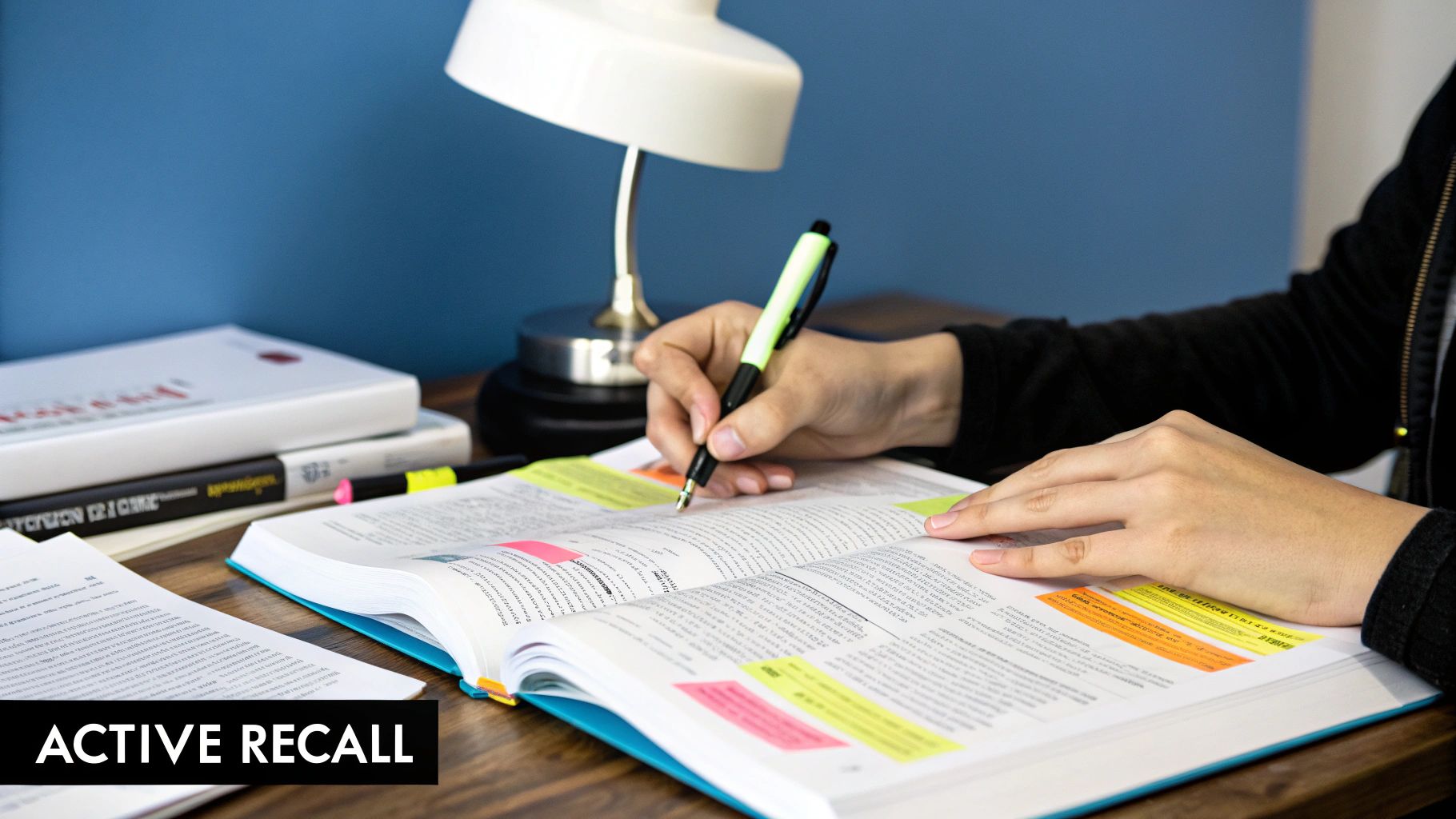
It’s easy to blame technology for our scattered focus. But what if we started treating it less like an enemy and more like a partner? When you use it intentionally, technology—especially artificial intelligence—can become one of your most powerful study aids.
The key is to change your mindset. Instead of seeing your devices as just sources of entertainment, view them as dedicated tools for learning.
Think of generative AI as a 24/7 tutor. It's there to help you brainstorm an essay topic when you're stuck, summarize a dense scientific paper, or explain a complex math problem in a way that finally clicks. According to the recent Chegg Global Student Survey, 80% of undergraduates are already using generative AI for their schoolwork.
But it’s not a magic bullet. The same survey found that 53% of students worry about getting bad information from AI, and for good reason. You can read more about student AI usage from Chegg.org.
AI is a starting point, not a final answer. Always double-check facts and figures from AI-generated content against your course materials or other reliable academic sources.
Choosing the Right Digital Tools
Not all apps are created equal. Some are basically slot machines designed to steal your attention, while others are built for deep, uninterrupted focus. Before you download another "productivity" app, run it through this quick mental checklist.
- What's its real purpose? Does it solve a specific problem, like Anki for flashcards or Zotero for organizing research? Or is it just social media in disguise? Be honest with yourself.
- What's the distraction potential? Look for a clean, minimal design. If an app has a social feed, gamified leaderboards, or endless notifications, it's probably working against your focus, not for it.
- How does it handle my data? Take a quick scan of the privacy policy. If an app demands a ton of personal info or is vague about how your data is used, it’s a red flag.
Parenting Tips for Mindful Tech Use
Parents, this is where your guidance is crucial. Banning devices usually backfires. A much better approach is to work with your teen to build a framework for using technology mindfully.
Start with an open conversation. Ask them which apps and websites actually help them with school, and which ones just pull them down a rabbit hole. Explore some educational AI platforms together and set clear boundaries around when and how they can be used.
Most importantly, model the behavior you want to see. When they see you put your phone away to concentrate on something, they're far more likely to do the same. This turns technology from a battleground into a shared tool for success.
How Mental Health Impacts Your Ability to Focus
Let's be real for a moment. You can have the perfect study setup, the slickest time-management app, and all the motivation in the world, but none of it matters if your mind isn't in a healthy place. True, lasting focus is impossible if you're battling serious stress, anxiety, or burnout. Your mental well-being is the foundation for everything, and when that foundation is shaky, even simple tasks can feel like climbing a mountain.
Think of your brain's available focus like the RAM on a computer. When stress and anxiety are constantly running in the background, they eat up a massive chunk of that mental bandwidth. That leaves very little processing power for the hard stuff, like wrapping your head around a physics problem or memorizing key historical dates. This isn't just a metaphor; it's how our brains work. Chronic stress directly messes with the prefrontal cortex—the part of your brain in charge of critical functions like attention and memory.
Recognizing When You Need Support
It’s one thing to have an off day. We all do. But it's another thing entirely when that "off day" turns into an "off week" or an "off month." It's so important to know the difference. That procrastination you're beating yourself up over? It’s not always laziness. Sometimes, it’s just an avoidance tactic your brain uses when it’s completely overwhelmed by anxiety. Feeling constantly drained and uninspired could be a sign of burnout or even depression.
Keep an eye out for these signals:
- Persistent Overwhelm: That nagging feeling that you can never, ever catch up, no matter how hard you try.
- Changes in Habits: Noticeable shifts in your sleep or eating patterns that stick around for more than a week or two.
- Loss of Interest: When the hobbies or activities you used to love just don't bring you any joy anymore.
- Irritability: Finding yourself snapping at friends or family over things that normally wouldn't bother you.
If any of this sounds familiar, it’s your brain sending up a flare. It's a sign to get some support. Acknowledging you need help isn't weakness—it's one of the strongest things you can do.
It's okay not to be okay. Your mental health is just as important as your physical health. Asking for help is the first and most powerful step toward regaining control and focus.
How Parents Can Help
Parents, this is where you come in. Your job is to create a safe harbor for these conversations, not to jump in with immediate solutions or, worse, dismiss their feelings. Sometimes, the most powerful thing you can do is just listen and validate what they're going through.
- Normalize the Conversation: Check in regularly. A simple, "How are you feeling mentally with all the school pressure?" can open the door and make it easier for them to talk when they're really struggling.
- Know the Resources: Don't wait for a crisis. Have a list of credible support options ready so you can offer real, tangible help when they ask for it.
- Focus on Well-being Over Grades: Make it clear you care more about their mental health than a test score. This takes the pressure off and shows them that their well-being is what truly matters most.
For a great starting point, exploring different stress management techniques for students can arm both you and your teen with practical tools.
Credible Resources for Teens and Families
Knowing where to turn can feel overwhelming, so here are a few trusted, accessible resources designed specifically for young people and their families:
- Crisis Text Line: For immediate, free, and confidential support, text HOME to 741741. It’s available 24/7.
- The Jed Foundation (JED): An incredible organization offering programs to protect emotional health and prevent suicide for teens and young adults.
- NAMI (National Alliance on Mental Illness): Provides education, support, and public awareness for individuals and families navigating mental illness.
- BetterHelp: An online platform that connects you with licensed therapists, many of whom specialize in counseling for teens.
At Andrew Petrillo Life Coaching, we know that academic success and personal well-being are deeply intertwined. If you or your teen are struggling with motivation, anxiety, or just trying to figure out how to balance it all, we're here. We help build the practical skills and confidence needed to not just survive, but thrive. Book a complimentary discovery call to see how one-on-one coaching can make a difference at https://andrewpetrillolifecoaching.com.

















